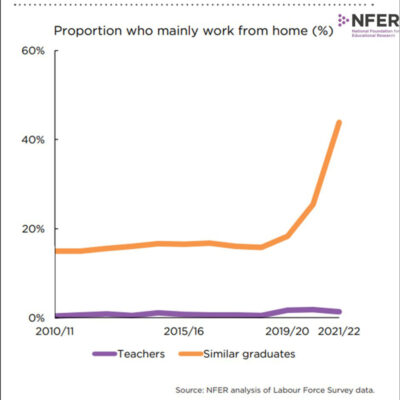Two schools are trialling a four-day teaching week to boost ailing recruitment and retention, with one head saying “yoga or free biscuits” just aren’t enough anymore.
Court Moor School, a secondary in Hampshire, will launch a £300,000 two-year trial from September for all teachers to teach four days, but continue to receive full-time pay
St Philip Howard Catholic Primary in Hertfordshire launched a similar scheme earlier this week, allowing staff one day a week off timetable for planning, preparation and assessment (PPA) and subject leader tasks.
Paul Jenkins, head of Court Moor School, said it had tried everything from an extra paid day off a year to free yoga classes and health checks.

The schemes come as recruitment numbers plunge, with teachers left behind in the rise of flexible working since Covid (see graph).
An extra five teachers have been recruited, including a maths and a geography teacher attracted by the new flexibility.
The school will cut the number of classes per week for teachers from about 26 each to 20.
“But they don’t address the fundamental issue. When you’ve got great staff, you need to make it somewhere they want to stay. It’s not about yoga or free biscuits – it’s about having less time in the classroom.”
But the amount of work teachers already do outside school hours means staff will not get a full day off.
The government’s recent survey found the average working week for teachers was 48.7 hours.
Jenkins said staff could use their non-teaching day for admin tasks or complete them on the other four evenings.
Extra teachers recruited for scheme
St Philip Howard has also employed an extra full-time and part-time teacher for its scheme, which will run until the end of the next academic year.
Staff must be in school on their “admin day”, however. Mairéad Waugh, its head, said the scheme aimed to “build up flexibility… We’re working towards [them being able to] drop the children off at school or get that elusive dentist or doctor’s appointment.”
The schemes will cost Court Moor about £150,000 and St Philip Howard £60,124 a year.
Jenkins said Court Moor had been “prudent” and had reduced capital spending. The extra £2.3 billion, announced in the autumn statement, had made the move a “possibility”.
Waugh said St Philip Howard had raised additional funds through regularly renting out its building.
Suzanne Beckley, the National Education Union’s policy specialist, said unfunded pay rises, record inflation and soaring energy costs would be “the main barrier” to such schemes in many schools.
Schools spend about £26.8 billion on teaching staff each year, so cover to allow all teachers in England to teach for four days a week would cost about £5.36 billion extra.
It would also put more pressure on recruitment as more staff would be needed.
“The question isn’t really whether it’s had an effect or not, it’s whether it’s financially sustainable,” Jenkins said.
DfE wants improved flexible working
Improving flexible working in schools is a key part of the DfE’s teacher recruitment and retention strategy, launched in 2019.
Earlier this year, it awarded outsourcing company Capita a £768,000 contract to run a national programme promoting flexibility across schools and multi-academy trusts.
The government’s working lives survey shows that, as of last year, fewer than half of teachers had some kind of flexible working – with working part-time being the most popular.
Data from the Labour Force Survey shows that the pandemic did not substantively affect the prevalence of home-working for teachers.
But the proportion of similar graduates who reported mainly working from home increased rapidly from about 15 per cent in 2018-19 to 44 per cent in 2021-22.
Teach First has called for a funded 20 per cent reduction in teacher classroom timetables in schools serving the most disadvantaged areas in a bid to make them more “competitive employers”.
Jack Kellam, a researcher at thinktank Autonomy – which has previously touted shortened weeks for schools – said it was important to have “more ambitious policies in place in education” or be left behind.
Teacher Tapp data shows that in January 2018, 42 per cent of teachers said they would choose the profession again if given the option.
When asked the same question this month, just 23 per cent said they would.
“Flexible working allows for a life and the more it becomes a standard in industry, the more Victorian education looks in comparison,” Kellam said.
The DfE was contacted for comment.
















This idea of a full day non-contact time should be standard practice by now and it’s a great shame. You will find there are many, many teachers who reduced their paid hours and went to four days to give themselves a non-paid day working on planning and prep at home. This is the only way I was able to get any work-life balance, but sacrificed the pay to remain in the profession.
I absolutely agree with you! I cut my contract down to a 3 day in school week when I had my twins. I still did around a full day at home working at my teaching and other school responsibilities.
Another colleague working in Higher Education training retail NVC courses, couldn’t believe the workload in teaching, and she took a 4 day week plus pay cut, so she could work all day a Friday from home, and then manage to get a weekend. She could also not believe the Monitoring and Scrutiny of teachers performance, and the setting of unrealistic targets.
Rubbish..
Well this flys in the face of the Government who are extending the school day for primary schools from this September
Tinkering around the edges will not halt the steady drift away from teaching .
This mess has been 13 years in the making the tories are bad for education children and teachers alike.
The one highlight teachers do have is teaching not the tory government nonsense of endless edicits and tick the box exercise stuff
Let teachers teach. unfortunately like other public servants they are under paid and undervalued. teachers are expected to be the government’s security eyes and ears the prevent strategy continues to morph into even more box ticking paranoia Teachers are also health and safety experts social workers and increasingly child psychiatrists
Teachers join the profession to teach not do less teaching
Start removing some of the endless stream of government bureaucracy and dogma offer a decent salary and start addressing some of the flaws in the privatisation of our school system academies are failing our children
That’s not a four day week. That’s a full time 5-day week, just with the ratio of classroom : non-classroom adjusted. Both are still work. You don’t say office staff do a 4 day week just because they spent about a fifth of their time in meetings. Absolutely where we need to be going, but the reporting is a bit misleading here.
Can I ask for clarification? Is this in addition to our statutory 3 hours for full time staff? Also if you have to be in school how is this flexible?
Virtually no chance of this being widespread. Yet people ask why there are total non-specialists teaching STEM subjects…a lot more monet to earn elsewhere. After my Science doctorate 30 years ago, teaching was an attractive proposition…now it is a terrible choice and I urge anyone considering it to walk away.